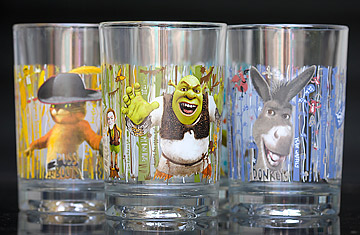
The McDonald's Shrek-themed glasses
Whether you're a fan of McDonald's or curse the company for the effect of its food on your waistline, you can't deny that the fast-food haven has improved its image over the years. McDonald's now offers healthier menu options, like fruit and salad, and innovations like its McCafé coffee brand have been a hit with customers. Further, the company has always connected with kids. So when news hit that its Shrek-themed drinking glasses contained potentially dangerous levels of cadmium, a carcinogen that can cause kidney ailments, the results could have been severe. There goes McDonald's again, creating a health hazard. And worse, they could be poisoning the kids who adore Ronald McDonald, Grimace and, by extension, those salty french fries.
So McDonald's issued a swift recall of the offending glasses. And analysts are giving the company high marks for its response to a potential disaster. "The takeaway from all this is that they were very proactive," says Jack Russo, an equity research analyst who covers McDonald's for Edward Jones, an investment banking and advisory firm based in St. Louis, Mo. "You have to be prepared for the worst." Russo was struck by the difference between the competent reaction of one multibillion-dollar corporation, McDonald's, and that of another quite prominent one that's been in the news lately, BP (he noted that the severity of their problems was quite different). "It was pretty brilliant," says Sophie Ann Terrisse, CEO of STC Associates, a brand-management firm, of the McDonald's response. "They came clean right away, and not only did they do what customers expected, they did more."
To wit: for every consumer who returns one of the 7.5 million Shrek glasses the company says it sold, McDonald's is offering a rare premium above the purchase price: a $3 refund for an item that cost $2.49 as a stand-alone purchase, and $1.99 with a purchase of food. "You've got to give them credit for turning the recall into a value proposition," says Terrisse. It helps, of course, that McDonald's can afford such generosity. Sales are strong; the company made $1.09 billion in the first quarter of 2010. Any financial hit from the company's refund will be worth the positive vibe it creates with consumers.
The whole incident does carry some long-term risks. Although the Shrek glasses weren't connected to the McDonald's Happy Meal, which comes with a toy, many concerned parents might not make that distinction. "People are so buried with information, so on the go, they could just think Happy Meals toys got contaminated," says Russo. Those kids' meals are a cash cow for the chain — Russo notes that fries and drinks are high-profit items, and the incremental cost of adding a cheap toy to the mix is negligible. And since the toy is a huge reason that kids demand, and parents buy, the Happy Meal, any damage to its reputation could creep into the bottom line.
Still, Russo doesn't see this bleak scenario playing out. "Their cachet with kids will not be destroyed," he predicts. After all, what does little Johnny care about a recall? He'll wail until he gets his toy, leaving his parents no choice but to purchase the Happy Meal. No chemical can quell his wrath. And no cadmium will slow down the McDonald's momentum.
